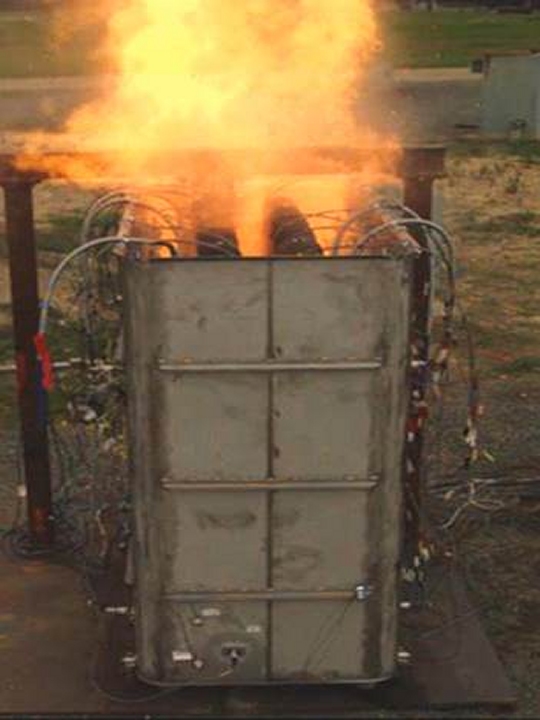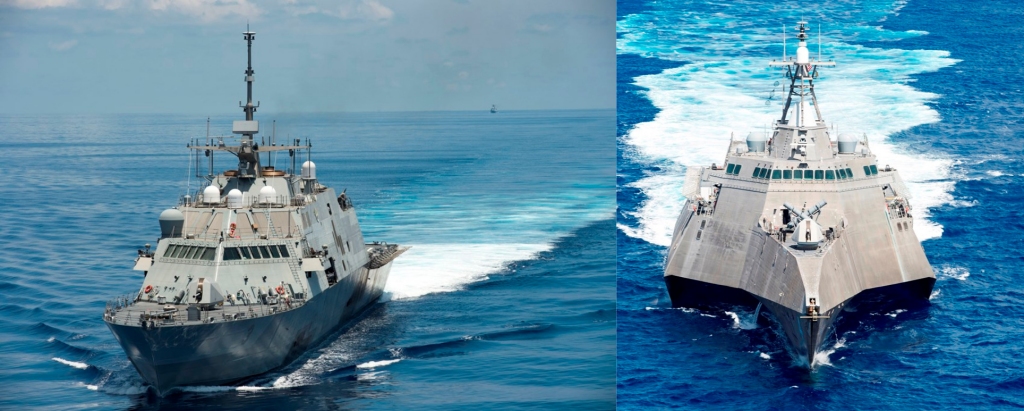 DAHLGREN, Va. - A Longbow Hellfire Missile rocket motor burns while being restrained within the container during a recent test of the missile exhaust containment structure at Naval Surface Warfare Center Dahlgren Division's (NSWCDD) Explosive Experimental Area. NSWCDD engineers successfully completed the restrained firing test of the Longbow Hellfire missile for the Littoral Combat Ship Surface-to-Surface Missile Module, the Navy announced, Oct. 6. "This critical test concludes another vital step in a series of efforts that will lead to the fielding of this tremendous capability to LCS and to the Fleet," said Capt. Ted Zobel, program manager for the LCS Mission Module Program. (U.S. Navy photo/Released)
DAHLGREN, Va. - A Longbow Hellfire Missile rocket motor burns while being restrained within the container during a recent test of the missile exhaust containment structure at Naval Surface Warfare Center Dahlgren Division's (NSWCDD) Explosive Experimental Area. NSWCDD engineers successfully completed the restrained firing test of the Longbow Hellfire missile for the Littoral Combat Ship Surface-to-Surface Missile Module, the Navy announced, Oct. 6. "This critical test concludes another vital step in a series of efforts that will lead to the fielding of this tremendous capability to LCS and to the Fleet," said Capt. Ted Zobel, program manager for the LCS Mission Module Program. (U.S. Navy photo/Released)DAHLGREN, Va. (Oct. 22, 2016)—Naval Surface Warfare Center Dahlgren Division (NSWCDD) engineers completed a restrained firing test of the Longbow Hellfire missile for the Littoral Combat Ship (LCS) Surface-to-Surface Missile Module (SSMM), the Navy announced Oct. 6.
The Longbow Hellfire missile - undergoing developmental testing for incorporation into the SSMM - is part of the Littoral Combat Ship surface warfare mission package.
Navy officials consider the test a major milestone proving the SSMM missile launch module's ability to withstand heat and fire in the event of an unplanned rocket motor ignition. Prior to integrating and testing the Longbow Hellfire missile aboard a Littoral Combat Ship, a series of tests must be accomplished to prove the safety of the system.
"This critical test concludes another vital step in a series of efforts that will lead to the fielding of this tremendous capability to LCS and to the Fleet," said Capt. Ted Zobel, program manager for the LCS Mission Module Program, after the test event held at the NSWCDD Explosive Experimental Area.
The missile exhaust containment structure (MECS) test is designed to duct missile exhaust and fire through plenum exhaust chambers in the top of the LCS Surface-to-Surface Missile Module. One live Longbow Hellfire missile - with an inert warhead and a non-functional guidance section - was fired but restrained in the launcher.
As the missile's rocket motor burned, exhaust and flames ducted properly through the MECS plenums. The test verified the MECS could prevent ignition exhaust fire from escaping into other missile modules.
In all, three mass-simulated Longbow Hellfire missiles and eight mass-simulated missiles with inert rocket motors were situated with the live missile to help evaluate the missile exhaust containment structure's effectiveness.
The Navy is planning to deploy the Longbow Hellfire missile capability aboard a Littoral Combat Ship by December 2017. Structural test firing from an LCS is scheduled to occur by March 2017.



